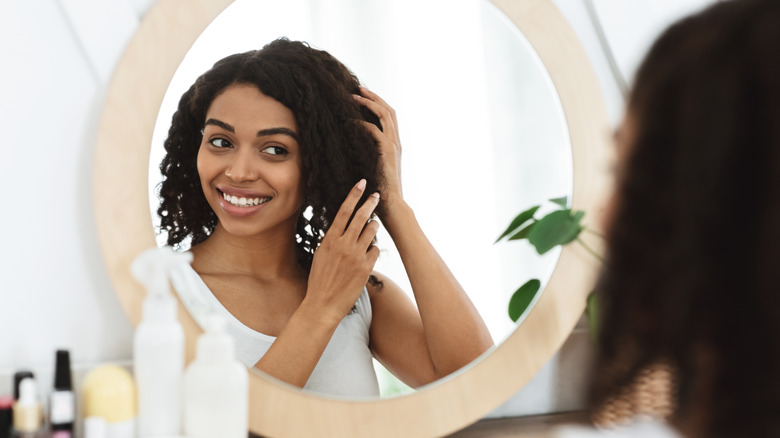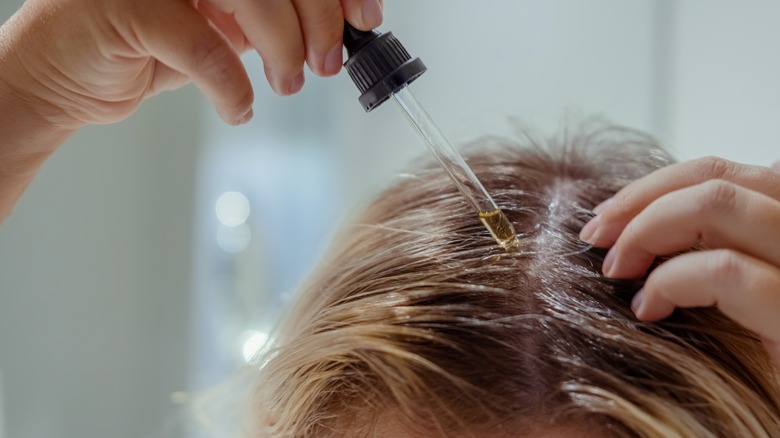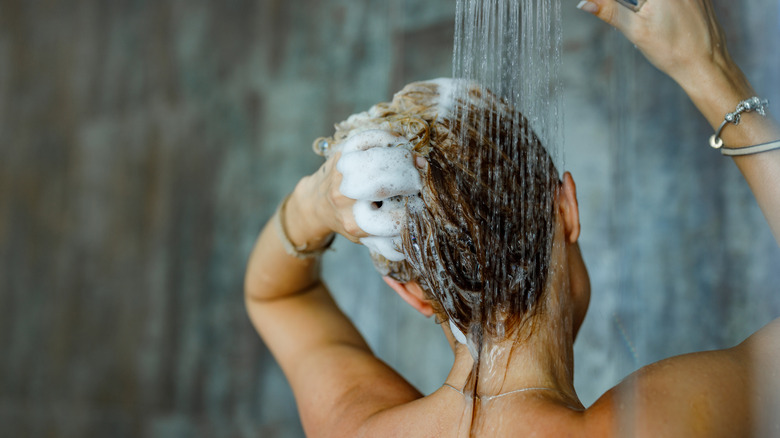Why You Need To Try Tea Tree Oil For A Healthier Scalp
We may receive a commission on purchases made from links.
Is an itchy, flaky scalp getting you down? We've all been there. The scalp is a sensitive part of the skin, and we might forget to give it some extra love and care. Tea tree oil has become a popular way to take care of the scalp specifically. It's an essential oil from the leaves of the Australian tea tree, used for hundreds of years to treat wounds and infections. It's been known to treat acne, lice, athlete's foot, and scalp problems. Research from Clinical Microbiology Reviews indicates that tea tree oil has antibacterial, anti-inflammatory, and antifungal properties.
Tea tree oil can be used on all hair types and textures, as it's primarily used on the skin itself. You might be wondering: Will hair oils do anything if you have an oily scalp? In the case of tea tree oil, yes! Tea tree oil can actually help regulate an overproduction of oil, according to hair experts at Byrdie. When your scalp is happy, your hair is happy too. So if you haven't yet tried tea tree oil, it could be a game-changer for you.
Tea tree oil helps with dandruff and inflammation
Many of us know the awkward feeling of noticing white dandruff flakes on your shirt. But don't worry — you're not alone! According to experts at Healthline, dandruff is a form of dermatitis caused by fungal infections, particularly a fungus called Malassezia naturally found on the scalp. It causes the scalp to feel itchy and dry, sometimes with visible flakes falling off the skin. Because tea tree oil has antifungal properties, it can help combat dandruff. In fact, a clinical study in the Journal of the American Academy of Dermatology found that when participants used 5% tea tree oil shampoo daily over four weeks, they experienced a 41% reduction in dandruff.
If you struggle with more serious irritation like psoriasis, tea tree oil may also help. Though more clinical research is needed, the National Psoriasis Foundation does recommend the oil as a natural remedy. Due to its anti-inflammatory properties, it can help reduce the redness and soothe the irritation that comes with these skin conditions.
Tips for using tea tree oil
You can buy tea tree oil itself or opt for shampoo and conditioner products with tea tree oil built-in. When using the oil on its own, it should be diluted with a carrier oil like coconut oil, almond oil, or grapeseed oil, as it can irritate the scalp further when used alone. Dermatologist Sheila Farhang, MD told Cosmopolitan to use a 1 to 10 ratio of tea tree oil to carrier oil — A tiny drop will go a long way. There are also pre-mixed hair and scalp oils, including Cantu Tea Tree & Jojoba Hair & Scalp Oil.
Using the oil itself 2-3 times per week will do the job. Apply it directly to your roots in different sections, and massage it into the scalp with your fingers (you can also use a gentle scalp massager). You don't need to oversaturate the entire head with oil; just the roots will do.
If you opt for a built-in shampoo, you can follow your typical hair-washing routine with tea tree oil. As indicated by the American Academy of Dermatology study, it's best to find products with 5% tea tree oil. We recommend Paul Mitchell Tea Tree Special Shampoo or Hask Tea Tree & Rosemary Shampoo. Tea tree shampoos can be used daily, but it's not always necessary to wash your hair every day. Give it a few weeks, and you'll likely see an improvement in your overall scalp health.


